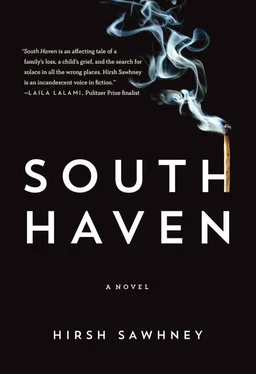Arjun commenced a long speech about the pointlessness of automobiles, which had made Americans lazy and dependent on autocratic governments. “They created this ,” he said, spreading his arms wide apart.
“This what?” asked Siddharth.
“This sprawl. It’s just. . disgusting. Americans are so isolated, so lonely. You ever wonder why?”
“Heavy,” said Ms. Farber. “Interesting.”
“But Mom,” said Marc, “I just said the same exact thing.”
Mohan Lal served himself more pie. “Son, what about your beloved workers? Didn’t Henry Ford give them jobs? Automobile factories have given the working class of this country some dignity.”
“Dignity?” countered Arjun. “Dad, Henry Ford was a racist.”
“Jesus,” said Mohan Lal. “What kind of pinkos are teaching you at the University of Michigan?”
Arjun cleared his throat. “I take it you won’t be applying for a job there. They’ll be devastated, I’m sure.”
* * *
After dinner, Siddharth was finally alone with his brother in the guest room, where Arjun carefully unpacked the contents of his worn backpack. He pulled out a wool sweater with little animals on it, then a hairbrush and several books. He placed these items in the dresser before picking up the photograph from Chandigarh that Siddharth had left for him.
“I heard they’re selling Nana-ji’s house,” said Arjun. “I wanna go back there this summer — see it one last time.”
“Great,” said Siddharth. “Have fun.”
“What’s the matter with you?”
“Nothing.” He didn’t know where to begin.
“I can tell something’s up — so talk.”
Siddharth shrugged. “You know Dad’s book?”
“Unfortunately.”
“Come on, Arjun. Don’t be like that. I’ve got a serious question.”
“So ask your question.”
“Well, I wanna know if Dad’s book is gonna be a hit. You think it’ll make us rich?”
Arjun snorted. “You’re kidding, right? Siddharth, it takes years to write a real book, not a few months. Dad, he’s writing more of a pamphlet — a silly piece of propaganda.”
“Propaganda?” Siddharth’s throat was now scratchy.
“Yeah, fascist propaganda.”
“You mean like the Nazis?”
“Not the Nazis. More like Hindu fascism.”
“That’s not even a real thing, Arjun.”
Arjun sat on the bed and placed a hand on Siddharth’s shoulder. “Listen, as long as I’m alive — and I plan on being here for a while — you don’t have to worry about anything, especially not money. Dad’s gonna find another job. And he has some money to fall back on.”
“He does?”
“Yeah, he does.”
“What money?”
“I really shouldn’t talk about it.”
“Come on,” said Siddharth. “I’m a teenager now.”
After some coaxing, Arjun explained that when their mother had died, their father received money from a life insurance policy. “It’s not a lot, but enough for a couple of years.”
As Siddharth lay in bed that night, the thought of this life insurance money made him feel lighter, but then he was overwhelmed by a wave of disgust. The only reason they had this money was because she was gone. Did that mean he was happy she was gone? You’re a freak , he told himself. A cruel and demented freak.
On the Thursday morning of February vacation, Ms. Farber dropped Marc off at Dinetta’s on her way to see clients at her place. Siddharth sat in front of the television, waiting for his real family to awaken. Arjun had been out late last night. He’d gone drinking with Derrick Rodgers, a roofer, and Sam Palmieri, who had taken over his father’s landscaping business. Siddharth couldn’t understand why his brother wanted to go out with people who weren’t in college. He wondered if Arjun was doing so to buy drugs.
Mohan Lal emerged first, just after ten, wearing sweatpants and a flannel robe. Siddharth made them pizza bagels, and while they were eating, Arjun walked into the kitchen wearing jeans and a sweatshirt. He gave Siddharth’s shoulders a brief massage and then downed a glass of water.
“You want one?” asked Siddharth.
“I’ll grab something when I’m out. The car needs an oil change.”
“I’ll come,” said Siddharth.
“We’ll both go with you,” said Mohan Lal.
Arjun grabbed Siddharth’s bagel from his plate and ate half of it in a single bite. “You’ll get bored,” he said, still chewing. “I have to run a bunch of errands, actually.”
“Which errands?” asked Mohan Lal.
“I need a new comforter. I need a copy of the Times. ”
Mohan Lal started grinning.
“Don’t start, Dad.” Arjun took a banana from the counter and peeled it open. “I’m not in the mood for one of your conspiracy theories.”
“What conspiracy theories?”
Siddharth knew all about his father’s conspiracy theories. Mohan Lal had always said that the Times was a State Department mouthpiece. It “bad-mouthed India” but “glossed over the fundamentalists in Pakistan.”
“Whatever, Dad,” said Arjun. “The Times is one of the most respected newspapers in the world. And my professor has an editorial coming out — about the riots.”
“Good for him,” said Mohan Lal, wiping his mouth.
“You should read it. Professor Sengupta’s pretty amazing. They say he’s gonna get a Nobel Prize.”
Mohan Lal plunked his dirty napkin onto his empty plate. “I know all about these Professor Senguptas. They’re sycophants. Pseudosecularists. Babbling Bengali Brahmins.”
“You know what, Dad?”
“Tell me.”
Arjun threw his peel into the trash compactor. “It’s just the way you operate — your way of controlling other people. You criticize everybody else because of your own insecurities.”
“Arjun,” muttered Siddharth, looking at him with narrowed eyes.
“Wonderful,” said Mohan Lal. “Now my son is also a psychologist.”
“Come on, Siddharth,” said Arjun.
“What?”
“Come with me — that is, if you want to.”
Siddharth felt bad admitting it, but he did want to go with his brother. And he was glad their father wasn’t coming with them.
Mohan Lal went to the sink and started doing dishes. He said, “Son, if I had insulted my father like that, he would have given me a thrashing.”
* * *
They got into Arjun’s borrowed Civic, and Arjun put in a cassette that sounded crackly and faded. He said it was a live performance by the Grateful Dead, a name that was vaguely familiar to Siddharth. For some reason he associated it with drugs — drugs and motorcycles. The music was surprisingly gentle, though, even a little babyish — the kind of thing they made him sing in the fourth grade.
Arjun took a right onto Post Road, where mountains of plowed snow were glimmering in the strip mall parking lots. Siddharth squinted, and his brother put on a pair of aviator sunglasses.
“Where’d you get those?” asked Siddharth.
“A friend. I’ll get you some when you’re older.”
The road was so clogged with cars that they had to wait six minutes to clear a single light. “Where the hell is everybody going?” said Arjun, lighting a cigarette. It was the third time he had done so in front of Siddharth. “It’s like, if they don’t buy something, they’ll go crazy — they won’t feel like good Americans.”
Siddharth’s stomach tingled. He wasn’t sure if he wanted to ask Arjun for a drag of his cigarette, or to make him promise to quit smoking. Neither option would go over well, so he just kept his mouth shut.
Arjun ashed his cigarette out the window. “How long has Dad been like this?”
Читать дальше












